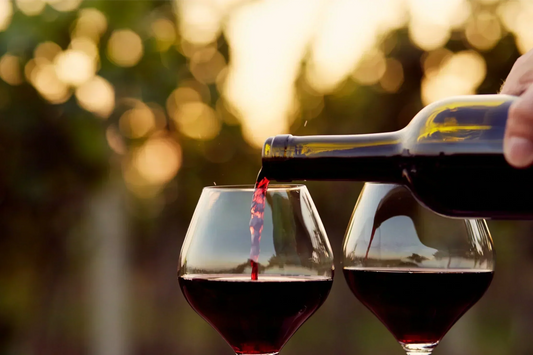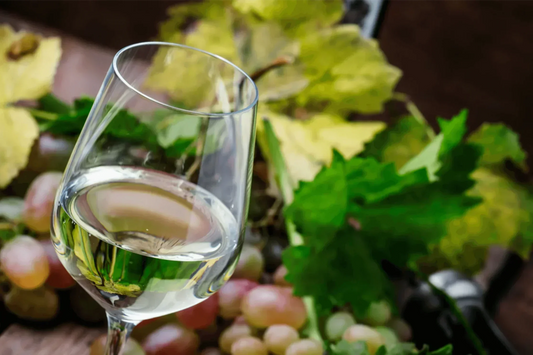
Does White Wine Go Off?
Ever found an old bottle of white wine hiding at the back of your cupboard? If so, you're not alone in wondering: Does white wine go bad? Whether it's a long-forgotten gift or part of your festive collection, understanding the shelf life of white wine is key to avoiding a disappointing sip, or, even worse, a spoiled evening.
In this article, we’ll dive into the signs to watch for and share the best storage tips to keep your white wine fresh and flavourful, whether it's opened or unopened.
Does White Wine Go Off?
Absolutely! It can happen quicker than you think.
White wine is quite delicate and can spoil easily, particularly due to its lower levels of tannins. These tannins, which act as natural preservatives, are found in minimal amounts in white wines, making them more susceptible to oxidation, the main reason wines can go off.
While you can enjoy unopened bottles for years if they’re stored properly, the moment you pop that cork, the clock starts ticking! Exposure to air, heat, and light accelerates the deterioration process.
How Long Does Unopened White Wine Last?
- Ready-to-drink white wines: These are best enjoyed within 3 to 5 years after bottling. Examples include Sauvignon Blanc, Pinot Grigio, and most unoaked Chardonnays.
- Aged or fine white wines: High-quality wines like Grand Cru Burgundy or Grosses Gewächs Riesling can age for 10 years or more, provided they’re stored under optimal conditions.
Caring for your white wine is important if you want to keep its quality and enjoy it longer! Even the finest bottles can go bad quite quickly when exposed to direct sunlight, sudden temperature swings, or changing humidity levels.
How Long Does White Wine Last After Opening?
Once you’ve opened a bottle of white wine, it's good to know that the freshness and flavour start to change over time. Generally, light-bodied whites, like Pinot Grigio or Sauvignon Blanc, remain enjoyable for about 3 to 4 days when stored properly. As for the full-bodied whites, such as Chardonnay or Viognier, they can oxidise more quickly, so it's great to savour them within 2 to 3 days. To keep your wine tasting its best after opening, try to minimise its exposure to oxygen and store it in a cool, stable environment.
Once opened, always:
- Re-cork or re-seal the bottle tightly to limit oxygen exposure
- Store it in the fridge to slow down the oxidation process
- Avoid keeping it at room temperature for extended periods, which accelerates spoilage
How to Tell If White Wine Has Gone Off
Curious if that bottle of white wine is still good to drink? While white wine doesn't always display obvious signs of spoilage, there are some sensory clues to consider. By taking a look at the wine’s appearance, checking for any unusual smells, and savouring a taste, you can easily decide if it's time to enjoy a glass or if it's better to pour it down the sink.
Here are the most common signs that your white wine has gone bad:
- Unpleasant or sour aroma: A vinegary, musty, or chemical smell is a clear indicator of spoilage due to oxidation or bacterial growth.
- Brownish or dull colour: Oxidised white wine often shifts from a light golden hue to a darker amber or brown.
- Flat or off-putting taste: Spoiled wine may taste stale, sour, or overly sharp, losing its fresh, fruity character.
- Unexpected fizz: If your still white wine is slightly fizzy or bubbly, it may have started a secondary fermentation and should not be consumed.
If you spot any of these signs in your wine, it’s wise to throw it out rather than risk an unpleasant experience.
How to Store Unopened and Opened White Wine
To prevent your white wine from spoiling too soon, follow a few simple storage tips, whether your bottle is still sealed or you've already had a glass.
For unopened bottles
- Store in a cool, dark place (10-15°C / 50-59°F)
- Keep the bottle on its side to maintain cork moisture
- Avoid constant vibration or temperature shifts
For opened bottles
- Reseal tightly with the original cork or a wine stopper
- Store upright in the refrigerator
- Use a vacuum pump to minimise oxygen exposure
Best Practices to Extend Shelf Life
- Avoid frequent temperature changes, especially from warm to cold
- Don’t store wine in the kitchen (too much heat and vibration)
- Invest in a wine fridge if you store bottles long-term
- Use smaller containers to reduce the oxygen-to-wine ratio
Tired of Wasting Wine? Here's Why Canned White Wine Makes More Sense
If you're reading this, chances are you've popped open a bottle of white wine, only to find out it’s not quite at its best anymore, or even worse, you’re left wondering if it’s still safe to sip! This is a frustration many wine lovers can relate to: it’s not just about the wasted wine, but also the money that feels like it’s gone down the drain.
This is exactly where canned white wine comes in to save the day!
Canned wine offers a more sensible and practical solution to these everyday challenges:
- Perfect portions: No need to open a whole bottle when you only want one glass
- Longer freshness: Each can is sealed tightly and stays fresh until the moment you open it
- No cork, no spoilage: You’ll never worry about cork taint or resealing again
- Chills faster, goes anywhere: Ideal for picnics, beach days, or a quick pour at home
👉 Subscribe now and enjoy exclusive access to our best-selling canned wines, delivered right to your door, perfectly portioned, and always ready to enjoy. Make wine simple again!
Conclusion
White wine can spoil, but you can prevent this with proper knowledge and storage techniques. Whether you’re ageing a prized bottle or enjoying one you’ve opened, it’s crucial to know its shelf life and the proper storage methods. Learn to recognise spoilage signs and give your wine care to preserve its flavour, quality, and overall experience!
FAQ
1. Can unopened white wine go bad if not stored properly?
Absolutely! Even if it’s still in the bottle, white wine can spoil if it’s subjected to heat, sunlight, or significant temperature changes. To keep its quality intact, it’s crucial to store it in a cool, dark place.
2. What does spoiled white wine taste like?
Spoiled white wine can taste quite unpleasant, often coming across as sour, flat, or even vinegary. It tends to lose its refreshing fruity notes and crispness, and you might notice some unwelcome sharpness or bitterness instead.
3. How should I store white wine after opening?
Make sure to reseal the bottle tightly and store it upright in the fridge. If you have a vacuum pump, use that as well. These simple steps will help to minimise oxidation and keep your drink fresh for several days.
4. Does refrigeration help white wine last longer?
Absolutely! Once you open a bottle of white wine, popping it in the fridge is a brilliant way to slow down oxidation. This helps preserve its flavour and aroma for about 2 to 4 days, depending on the wine.



